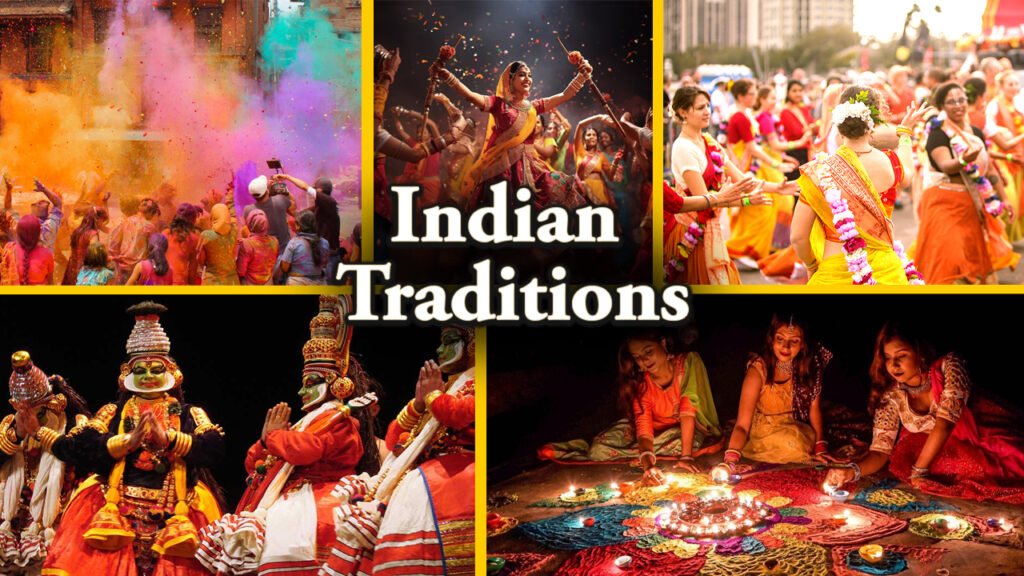Introduction to Indian Traditions
India, a land of ancient wisdom and rich cultural heritage, has been the cradle of numerous traditions that have stood the test of time. What’s fascinating is that many of these age-old practices have scientific underpinnings that modern research is only now beginning to unravel. From yoga to Ayurveda, from traditional cuisine to classical music, Indian traditions are not just cultural artifacts but repositories of scientific knowledge. Let’s embark on a journey to explore the scientific significance behind some of India’s most cherished traditions.
The Scientific Basis of Yoga
Physical Benefits
Yoga, perhaps India’s most famous export to the world, is more than just a series of physical postures. Scientific studies have shown that regular yoga practice can improve flexibility, strength, and balance. It’s not just about touching your toes; yoga has been linked to better cardiovascular health, reduced chronic pain, and improved respiratory function.
Mental Health Advantages
But yoga’s benefits extend beyond the physical realm. Research has demonstrated its positive impact on mental health. Regular practitioners report reduced stress levels, improved mood, and better sleep quality. The mindfulness aspect of yoga has been shown to alleviate symptoms of anxiety and depression, making it a valuable tool in mental health management.
Ayurveda: Ancient Wisdom for Modern Health
Holistic Approach to Wellness
Ayurveda, India’s traditional system of medicine, takes a holistic approach to health that modern medicine is increasingly recognizing. Its emphasis on balance and individualized treatment aligns with the growing understanding of personalized medicine.
Herbal Remedies and Their Efficacy
Many Ayurvedic herbs have been scientifically proven to have medicinal properties. For instance, turmeric, a staple in Ayurvedic medicine, has been shown to have powerful anti-inflammatory and antioxidant effects. The scientific community is now exploring these traditional remedies for potential new drugs.
The Science Behind Indian Cuisine
Spices and Their Medicinal Properties
Indian cuisine is renowned for its bold flavors, but did you know that many of the spices used have medicinal properties? Cumin aids digestion, cinnamon helps regulate blood sugar, and ginger has anti-inflammatory properties. The liberal use of spices in Indian cooking isn’t just about taste; it’s a form of preventive medicine.
Balanced Nutrition in Traditional Meals
Traditional Indian meals, with their combination of grains, lentils, vegetables, and dairy, provide a balanced nutritional profile. The concept of eating seasonally, deeply ingrained in Indian food culture, aligns with modern nutritional advice about consuming local, fresh produce.
Vedic Mathematics: Ancient Techniques for Modern Problem-Solving
Vedic mathematics, derived from ancient Indian texts, offers quick mental calculation techniques. These methods, which simplify complex calculations, are not just mathematical curiosities but effective tools for enhancing numerical skills and problem-solving abilities.
The Astronomical Advancements in Ancient India
Ancient Indian astronomers made remarkable observations and calculations. The concept of zero, the calculation of earth’s circumference, and the heliocentric model of the solar system were all proposed by Indian astronomers long before they were accepted in the West.
Traditional Indian Architecture and Its Environmental Wisdom
Traditional Indian architecture incorporates principles of environmental science. The use of courtyards for natural ventilation, thick walls for insulation, and rainwater harvesting systems demonstrate an advanced understanding of sustainable living that we’re only now rediscovering.
The Scientific Significance of Indian Festivals
Seasonal Celebrations and Their Health Benefits
Many Indian festivals coincide with seasonal changes and have health benefits. For example, the spring festival of Holi, with its use of natural colors and water play, aligns with the body’s need to cool down as temperatures rise.
Social Cohesion and Psychological Well-being
Festivals also serve a social function, fostering community bonds and promoting psychological well-being. The sense of belonging and shared joy during festivals has been linked to improved mental health outcomes.
Indian Classical Music and Its Impact on the Brain
Indian classical music, with its complex rhythms and intricate melodies, has been shown to have a profound impact on the brain. Studies have found that listening to and practicing Indian classical music can enhance cognitive function, reduce stress, and even aid in the treatment of certain neurological disorders.
The Logic Behind Indian Spiritual Practices
Meditation and Its Neurological Effects
Meditation, a cornerstone of Indian spiritual practices, has been extensively studied for its neurological effects. Regular meditation has been shown to increase gray matter density in the brain, improve focus, and reduce symptoms of anxiety and depression.
Mantras and Sound Therapy
The chanting of mantras, often dismissed as mere superstition, has been found to have therapeutic effects. The rhythmic repetition of sounds can induce a state of relaxation and focus, similar to the effects of mindfulness practices.
Ancient Indian Metallurgy and Its Technological Marvels
The famous Iron Pillar of Delhi, which has resisted corrosion for over 1600 years, stands as a testament to the advanced metallurgical knowledge of ancient Indians. The techniques used in its creation continue to baffle modern scientists.
The Environmental Wisdom in Indian Traditions
Sacred Groves and Biodiversity Conservation
The concept of sacred groves in Indian tradition has served as an effective tool for biodiversity conservation. These protected patches of forests have preserved countless species and ecosystems.
Traditional Water Conservation Methods
Ancient Indian water conservation methods, such as step wells and tank irrigation systems, demonstrate a sophisticated understanding of hydrology and sustainable water management.
The Scientific Basis of Indian Art Forms
Indian classical dance forms like Bharatanatyam and Kathak involve intricate footwork and hand gestures that improve coordination, balance, and cognitive function. The storytelling aspect of these art forms also aids in preserving cultural knowledge and enhancing memory.
Indian Traditional Games and Cognitive Development
Traditional Indian games like Chess (which originated in India as Chaturanga) and Pallanguzhi are not just pastimes but tools for cognitive development. These games enhance strategic thinking, mathematical skills, and problem-solving abilities.
Read Also: Worship These Gods for Love Marriage
Conclusion
As we’ve explored, Indian traditions are not just cultural practices but repositories of scientific wisdom. From health and wellness to environmental conservation, from mathematics to metallurgy, these traditions offer insights that are increasingly relevant in our modern world. As we face global challenges, perhaps it’s time to look back at these ancient practices with fresh eyes, appreciating their scientific significance and learning from their timeless wisdom.
For interesting astrology-related videos, subscribe to us on YouTube
FAQs
- Are all Indian traditions scientifically proven?While many Indian traditions have scientific backing, not all have been extensively studied. Ongoing research continues to uncover the scientific basis of various practices.
- Can non-Indians benefit from these traditional practices?Absolutely! The principles behind these traditions are universal and can benefit anyone, regardless of their cultural background.
- How do Indian traditions compare to modern scientific practices?Indian traditions often take a holistic approach, which complements the more specialized focus of modern science. They can offer alternative perspectives and solutions to contemporary problems.
- Are there any risks associated with following these traditional practices?As with any practice, it’s important to approach them with proper guidance. Some Ayurvedic remedies, for instance, may interact with modern medications. Always consult with healthcare professionals.
- How can I incorporate Indian traditions into my daily life?Start small – try incorporating yoga or meditation into your routine, experiment with Indian spices in your cooking, or explore Indian classical music. The key is to find practices that resonate with you and integrate them gradually.

